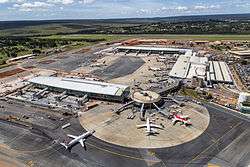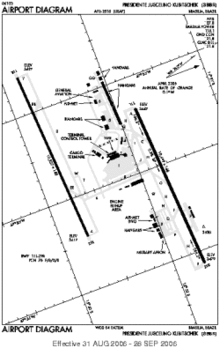Brasília International Airport
| Brasília–Pres. Juscelino Kubitschek International Airport Aeroporto Internacional de Brasília–Pres. Juscelino Kubitschek | |||||||||||||||
|---|---|---|---|---|---|---|---|---|---|---|---|---|---|---|---|
 | |||||||||||||||
| IATA: BSB – ICAO: SBBR | |||||||||||||||
| Summary | |||||||||||||||
| Airport type | Public/Military | ||||||||||||||
| Operator | Inframérica | ||||||||||||||
| Serves | Brasília | ||||||||||||||
| Hub for | |||||||||||||||
| Elevation AMSL | 1,066 m / 3,497 ft | ||||||||||||||
| Coordinates | 15°52′09″S 047°55′15″W / 15.86917°S 47.92083°WCoordinates: 15°52′09″S 047°55′15″W / 15.86917°S 47.92083°W | ||||||||||||||
| Website | www.bsb.aero | ||||||||||||||
| Map | |||||||||||||||
 BSB Location in Brasília | |||||||||||||||
| Runways | |||||||||||||||
| |||||||||||||||
| Statistics (2015) | |||||||||||||||
| |||||||||||||||
Brasília–Presidente Juscelino Kubitschek International Airport (IATA: BSB, ICAO: SBBR) is the airport serving Brasília, Brazil. Since 22 April 1999 the airport is named after Juscelino Kubitschek de Oliveira (1902–1976), the 21st President of Brazil.[4] It is located in the Lago Sul administrative region of the Federal District of Brazil. Some of its facilities are shared with the Brazilian Air Force. It is operated by Inframerica
History

Brasília was only a project when in 1956 President Juscelino Kubitschek landed for the first time in the Central Plateau. However, Vera Cruz Airport, built in 1955 by the then Deputy-Governor of Goiás, Bernardo Sayão, at the request of the chairman of the location of the New Federal Capital, Marechal José Pessoa, already existed. On 2 October 1955, the airport received the first crew of workers that would build the new capital. This facility was located where today is the Integrated Bus and Train Terminal of Brasília. It had a dirt runway of 2,700 metres (8,900 ft) and a passenger terminal in a makeshift, cob-wall shack covered with buriti-leaves.[5]
This facility, however, was only temporary. The relocation to a definitive site had already been identified as a priority and construction works started on 6 November 1956. The works lasted for only over six months and required the clearing of an area of 1,334 million square metres (14,360×106 sq ft), 178,500 square metres (1,921,000 sq ft) of earthwork, base-stabilized 40,900 square metres (440,000 sq ft), covering 73,500 square metres (791,000 sq ft), topographical services, positioning and leveling. The runway was designed to have a length of 3,300 metres (10,800 ft) but initially it had only 324 metres (1,063 ft), and was 45 metres (148 ft) wide. The passenger terminal was built of wood. On 2 April 1957, the presidential aircraft landed for the first time at the site and the official inauguration took place on 3 May 1957. That year, on the same location the Brasília Air Force Base was also commissioned.[5]
In 1965 Oscar Niemeyer proposed a project for Brasília Airport to replace the wooden terminal. However, due to the 1964 Brazilian coup d'état, the military-government chose to build the project of Tércio Fontana Pacheco, an architect of the Brazilian Air Force Ministry. The airport is thus one of the few important buildings in Brasília that is not related to Niemeyer.[6] This building was opened in 1971 and since 1990 it has been under renovation following an architectural concept of the architect Sergio Roberto Parada.
In 1990 Brasília International Airport underwent its first major renovation and began to gain its present form with a central body and two satellites. The first phase included the construction of an access-viaduct to the passenger terminal and metal cover inaugurated in 1992 and the first circular satellite, inaugurated in 1994. In the second phase, the main body of the passenger terminal was renovated to include a shopping-mall and the satellite received nine jetways. In 2005, a second runway was opened.[5] In April 2014 the South Concourse, which serves domestic flights, was opened.
Until April 2014 the terminal was capable of handling 9 million passengers per year, but actually handled around 14 million. With numbers constantly increasing, the former terminal for general aviation originally built in 1988 was renovated and transformed into Passenger Terminal 2. It was opened for traffic on 2 August 2010.[7]
Following a decision made on 26 April 2011 by the Federal Government for private companies being granted concessions to explore some Infraero airports,[8] on 6 February 2012, the administration of the airport was conceded, for 25 years, to the Consortium Inframérica, formed by the Brazilian Engineering Group Engevix (50%) and the Argentinean Group Corporación América (50%).[9] Inframérica also won the concession of Gov. Aluízio Alves International Airport in Natal.[10] Infraero, the state-run organization remains with 49% of the shares of the company incorporated for the administration.[11][12]
The Brazilian Integrated Air Traffic Control and Air Defense Center section 1 (Cindacta I) is located in the vicinity of the airport.[13]
On 31 August 2009, Infraero unveiled a BRL514.8 million (USD306.06 million; EUR224.76 million) investment plan[14] to renovate Presidente Juscelino Kubitschek International Airport, focusing on the preparations for the 2014 FIFA World Cup, Brasília being one of the venue cities, and the Summer Olympics in 2016 which are held in Rio de Janeiro, Brazil:
- Enlargement of apron and taxiways (BRL 34.5 million). Completed in April 2013
- Renovation of the existing passenger terminal (BRL 22.5 million). Completed in November 2015
- Enlargement of the passenger terminal. (BRL 439 million) Completed in April 2015
- Parking (BRL 18 million) Completed in April 2014
Between 2012 and 2014, the consortium INFRAMERICA invested R$1.2 billion [15] to remodeling the terminal, increasing from 13 to 29 fingers, 40 to 70 airplane positions.
For 2016-19 are planned investments with international area, new parking build, four new hotels, business area and other facilities.
Airlines and destinations
Passenger
Cargo
| Airlines | Destinations |
|---|---|
| LATAM Cargo Brasil | Manaus, São Paulo-Guarulhos |
| Rio Linhas Aéreas | Cuiabá, São Paulo-Guarulhos |
Accidents and incidents
- 22 December 1962: a Varig Convair CV-240-2 registration PP-VCQ flying from Belo Horizonte-Pampulha to Brasília descended below the prescribed altitude while on final approach to Brasília, struck trees, skidded and fell to one side. One crew member died.[17]
- 25 April 1970: a VASP Boeing 737-2A1 en route from Brasília to Manaus-Ponta Pelada was hijacked by a person who demanded to be flown to Cuba. The hijack lasted a day.[18]
- 14 May 1970: a VASP Boeing 737-2A1 en route from Brasília to Manaus-Ponta Pelada was hijacked by a person who demanded to be flown to Cuba. The hijack lasted a day.[19]
- 22 February 1975: a VASP Boeing 737-2A1 registration PP-SMU en route from Goiânia to Brasília was hijacked by a person who demanded ransom. The hijacker was taken down.[20]
- 25 May 1982: a VASP Boeing 737-2A1 registration PP-SMY on landing procedures at Brasília during rain, made a hard landing with nose gear first. The gear collapsed and the aircraft skidded off the runway breaking in two. Two passengers out of 118 occupants died.[21]
Access
The airport is located 11 km (7 mi) from downtown Brasília.
See also
References
- ↑ "Estatística de voos (janeiro a dezembro de 2015)". Aeroporto de Brasília. 19 February 2016. Retrieved 19 February 2016.
- ↑ "Airport Official Website" (in Portuguese). Aeroporto de Brasília.
- ↑ "Lista de aeródromos públicos" (in Portuguese). ANAC.
- ↑ "Lei n˚9.794, de 20 de abril de 1999" (in Portuguese). Lei Direto. 22 April 1999. Retrieved 25 May 2011.
- 1 2 3 "Aeroportos: Brasília" (in Portuguese). Jetsite. Retrieved 31 May 2011.
- ↑ Parada, Sergio Roberto. "Aeroporto de Brasília, uma questão de arquitetura" (PDF) (in Portuguese). IABDF. Retrieved 25 May 2011.
- ↑ "Terminal 2 do aeroporto de Brasília recebe voos regulares" (in Portuguese). Infraero. 1 September 2010. Retrieved 30 September 2010.
- ↑ Bitencourt, Rafael (26 April 2011). "Governo define concessão de obras em 3 aeroportos, diz Palocci" (in Portuguese). Valor Online. Retrieved 16 May 2011.
- ↑ Rittner, Daniel (7 February 2012). "Cumbica, Viracopos e Brasília são privatizados" (in Portuguese). Valor Econômico. Retrieved 22 March 2012.
- ↑ Guimarães, Ligia (22 August 2011). "Consórcio Inframérica vence leilão de aeroporto São Gonçalo do Amarante" (in Portuguese). G1. Retrieved 22 March 2012.
- ↑ Salomon, Marta; Monteiro, Tânia (1 June 2011). "Governo pretende privatizar três aeroportos e abrir o capital da Infraero" (in Portuguese). O Estado de S. Paulo: Economia. Retrieved 22 March 2012.
- ↑ "Brazil moves swiftly (at last) to award airport concessions". CAPA. 9 February 2012. Retrieved 5 March 2012.
- ↑ "Cindacta I" (in Portuguese). Brazilian Air Force: Departamento de Controle do Espaço Aéreo DECEA. Retrieved 4 May 2011.
- ↑ Rittner, Daniel; Braga, Paulo Victor (31 August 2009). "Infraero vai gastar R$5 bi em reforma de aeroportos". Valor Econômico (in Portuguese). pp. A4. Retrieved 22 March 2012.
- ↑ "Investments". Inframérica. Retrieved 19 February 2016.
- ↑ "LATAM Airlines Brasil 1Q17 Brasilia international adjustments". routesonline. Retrieved 12 August 2016.
- ↑ "Accident description PP-VCQ". Aviation Safety Network. Retrieved 16 May 2011.
- ↑ "Incident description Vasp April 25, 1970". Aviation Safety Network. Retrieved 30 May 2011.
- ↑ "Incident description Vasp May 14, 1970". Aviation Safety Network. Retrieved 30 May 2011.
- ↑ "Incident description PP-SMU". Aviation Safety Network. Retrieved 30 May 2011.
- ↑ "Accident description PP-SMY". Aviation Safety Network. Retrieved 30 May 2011.
External links
![]() Media related to Brasília International Airport at Wikimedia Commons
Media related to Brasília International Airport at Wikimedia Commons
- Airport information for SBBR at World Aero Data. Data current as of October 2006.Source: DAFIF.
- Airport information for SBBR at Great Circle Mapper. Source: DAFIF (effective October 2006).
- Current weather for SBBR at NOAA/NWS
- Accident history for BSB at Aviation Safety Network
- Documentary about Brasília International Airport
- SIBS - Industrial Area close to Brasilia's Int'l Airport